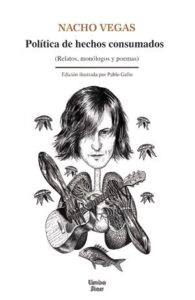About the book
Eroticism, vanity, greed and power. Passions in contemporary life
Áxel Capriles unravels at the Book Fair the passions that deceive us
It is not the novelties that are most interesting about book fairs, but the encounter with long-term books, with original writings that transform the understanding of the topics and that, for some strange reason, had not been read before.
This is the case of the essay by the Jungian psychoanalyst Áxel Capriles M., Eroticism, vanity, greed and power. Passions in contemporary life, published in the Noema collection, by Turner publishing house, which I found at the Madrid Book Fair that takes place in El Retiro park until June 6.
To talk about emotions and passions is to talk about life itself and centuries of discussion about its nature and meaning. From irrational emotions we move on to intelligent ones and from disorganizing reactions to adaptation mechanisms.
Áxel Capriles’s essay takes a twist that makes it entirely original. Almost all interpretations of emotions start from their organic origins and are understood in terms of the objects to which they are directed, in terms of the adaptation processes of the external world, not in reference to the internal world, to the universe of subjective meanings that They constitute and mark the personality of each person, their changes and transformations. A simple change of gaze allows us to understand thousands of contradictions and apparent conflicts between the different ways of understanding human affections.. Each passion has a pattern in which each of its parts is a symbol or expression of the movements of the soul, that is, of psychic development.
Eroticism, vanity, greed and power. The passions in contemporary life, It dedicates a first chapter to emotions in general, and four to specific passions: eroticism, fame, greed and power. Each essay has its richness.
In times of politicization of sex, in the process of becoming a matter of public policy, A note on exoticism and eroticism returns eroticism to intimate life and discovers it as a vehicle of refinement and culture.
In times of social networks and influencers, Biography of the selfie or why we love each other so much, is an ingenious essay to analyze contemporary narcissism.
In the chapter on Greed and voracity, Capriles highlights the importance of differentiating emotions as the most difficult work in the development of people. And although the desire to possess has nothing to do with love, nor money with self-esteem or happiness, many confuse the language of one emotion with another.
The last essay of the book, Power and psychopathic inferiority, It has particular relevance for contemporary times. It examines the rise of psychopathic personalities who tend to reach positions of influence and power, in governments and companies, and I would say even in charities, and warns about the increasingly frequent phenomenon of the triumph of the adapted psychopath. They are unhealthy and toxic personalities who, however, gain the favor and even the love of the masses.
Capriles moves the reader to analyze not only why narcissistic and psychopathic personalities need to be adored and idealized, like so many that we see triumphant in politics, but why we all have an infinite need to idealize others. The book draws attention to the political consequences of allowing ourselves to be seduced by the charm of the psychopath, it forces us to review his intimate connection with our fissures, our own psychopathic gaps. Time for psychology to hit the streets.
Source: https://algunoslibrosbuenos.com/erotismo-vanidad-codicia-y-poder


